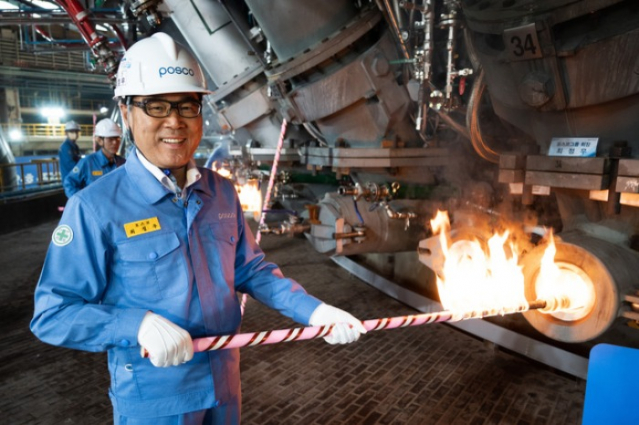
POSCO Group CEO Choi Jeong-woo reignites the No. 4 blast furnace in POSCO Gwangyang plant (Courtesy of POSCO) South Korea’s leading steelmaker POSCO Group reignited its No. 4 blast furnace in Gwangyang plant on June 10. The blast furnace has been upgraded as a more eco-friendly and smart facility after the 18-month-long second refurbishment. The No. 4 blast furnace was constructed in September 1992 with an internal capacity of 3,800 cubic meters. Through the first refurbishment in 2009, it expanded the internal capacity to 5,500 cubic meters and became the Gwangyang plant’s first super-large blast furnace. POSCO injected 370.3 billion won ($289.3 million) in the second refurbishment, the steelmaker said.The second refurbishment has focused on reducing air pollutants and cutting manufacturing costs via an AI-powered system while keeping the current internal capacity.In detail, it applied new breathers for exhaust gas and added dust collectors in the piping equipment. These new facilities will reduce the blast furnace’s fine dust emission by up to 90%, POSCO said. The steelmaker also set AI-powered system to expect and control manufacturing processes to save costs and improve workflow stability.POSCO will optimize the manufacturing process of the blast furnace for carbon footprint reduction. The steelmaker announced in May that it will invest 53 trillion won by 2026 primarily in its steel, rechargeable battery materials and hydrogen businesses. Of the investment, 20 trillion won will be injected in transforming steel production facilities into eco-friendly ones and producing steel for electric vehicle motors, the company said. Last November, the steelmaking giant said it will build a plant for non-grain-oriented electrical steel sheets, a key material in the traction motors of electric cars. Once the construction is completed in 2025, its current 100,000 tons of steel sheet metal production per year will increase to 400,000 tons. The annual production volume is enough for 8 million EVs, given that 50 kilograms of non-grain-oriented electrical steel sheets are needed for each EV. By Kyung-Min Kangkkm126@hankyung.comJihyun Kim edited this article.
Most Read